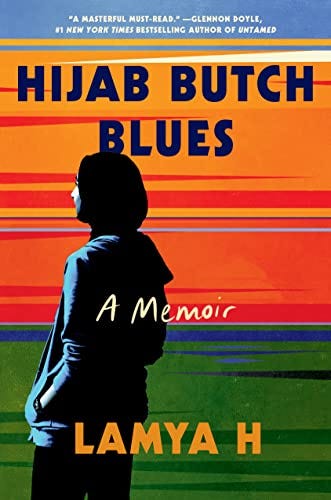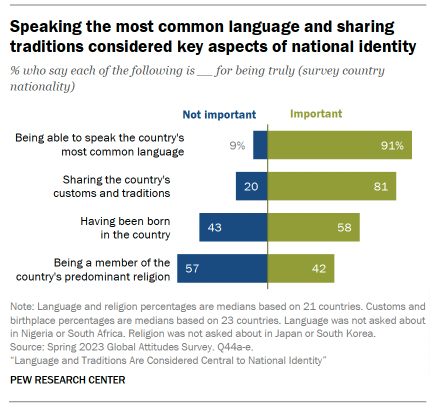The 194th Block: Hello, is anybody out there?
Speech, language, and communication, and the information disorder
This week…
Your reading time is about 6 minutes. Let’s start.
Sofia Vergara, while doing media to promote her Netflix show about the Colombian drugload Griselda was again mocked for her accent in an interview. (How tiring.) Elsewhere, Corporate Erin, Lisa Beasley’s TikTok character who uses corporate lingos in a corporate accent in her TikTok skits, is going semi-viral again. (It happens every few months – this time on HuffPost and BI.) And a Pew survey showed many countries link the ability to speak the country’s language with national identity. (I will fit into many countries, then, right?)
Speech, language, and communication are the building blocks to information dissemination, and thus play a role in information disorder—the main focus of TSB. How much misinformation has been spewed due to language discrimination and accent bias! But sometimes when I see similarly themed stories about trends in language and accent in the news cycle, I want to take a step away for a bit from regular business and just geek out.
From my archive
While I was a radio producer at BFM89.9, my colleague Kelvin Yee produced a series called Lingo, a show about our relationship with language and its impact on our cultures and traditions. I immediately thought of this series when I read the Pew survey, and I want to recommend it to you, which you can listen to here. He discussed, among other things, Singlish, the N-word, and the gay voice.
Speaking of the gay voice (Michael Schulman / New Yorker $), there are many old articles all over the web about other vocal trends such as the ‘HAY GUUYSSS’ vlogger voice (Sarah Hagi / Vice), the not-sou-gouid indie pop voice (Reggie Ugwu / Buzzfeed News), the—unique—NPR voice (Teddy Wayne / NYT), and the NPR story about vocal fry (Terry Gross / NPR).
In one Lingo episode, Kelvin also spoke to a UN interpreter, which gave me flashbacks about my time covering UN meetings. Because of my science education, I was comfortable with the academese (Victoria Clayton / The Atlantic $), but I was overwhelmed by the legalese (Shawn Burton / HBR $). It was the first time that I [maybe] understood the function of the square brackets (Uri Friedman / The Atlantic $) and took seriously the distinction between the modal verbs ‘should’ and ‘shall,’ which apparently almost derailed the Paris Agreement (John Vidal / The Guardian). It gave me an appreciation for Euro English (Michael Skapinker / FT), but it also reminded me of a few articles on why native English speakers are the worst communicators in global business (Spencer Hazel, University of Nottingham / The Conversation) or in general, really (Lennox Morrison / BBC).
Back in the present, there are a few TikToks (such as this one) that have recently made their rounds about the Asian American accent (or similarly, the Asian Australian accent). No, they don’t speak with an Asian accent, it’s distinctively American, yet also Asian-ish. I recognise this here in Canada. There is a certain lilt to it, but I can’t place my finger on it. Can anyone?
Anyway, I hope if any of these stories resonate with you, that you don’t feel self-conscious about it, and find your voice like Curtis Chin did. The gay Asian American author found his while narrating his memoir, a story he shared in LitHub.
And now, back to regular programming, here’s a selection of top stories on my radar, a few personal recommendations, and the chart of the week.
ICYMI: The Previous Block pictured trust and credibility through an AI influencer, Cranky Uncle, and the world's leading search engine. CORRECTION NOTICE: None notified. A leak-hosting site looks to thaw the chill of censorship
Mathew Ingram for CJR:
According to the Daily Beast and other outlets, the initial lawsuit against Reuters is part of a wider legal battle launched by Rajat Khare, a co-founder of Appin, and law firms including Clare Locke LLP, which boasts on its website about its track record of “killing stories” about its clients. The Daily Beast reported that references to Khare have been removed from a collaborative investigation between London’s Sunday Times and the nonprofit Bureau of Investigative Journalism; a news story published in Luxembourg; and a report from the Swiss national broadcaster. Semafor reported, meanwhile, that Clare Locke sent legal threats to The New Yorker about a story on India’s hack-for-hire industry. (The New Yorker’s story is still online; Khare’s lawyer told Semafor that Khare “does not comment on actual or alleged legal proceedings,” but does “defend himself judicially in all relevant jurisdictions against any attacks that target him and illegitimately damage his reputation.”) Lawfare also edited an article that it had published to remove details taken from the Reuters report. And the Internet Archive, which had hosted a backup copy of the Reuters story, has taken it down. (The story has been replaced with the message: “this URL has been excluded from the Wayback Machine.”)
Enter the leak-hosting site, Distributed Denial of Secrets, DDoSecrets, where you can, for now, still read the original Reuters article.
A new kind of climate denial has taken over on YouTube
Justine Calma for The Verge:
In the past, content that falsely claimed that climate change was either not happening or not a result of humans burning fossil fuels dominated disinformation channels. That’s not the case anymore, according to an analysis by the nonprofit Center for Countering Digital Hate (CCDH). Instead, the most common lies about climate change now have to do with denying the benefits of clean energy, attacking policies meant to slash planet-heating pollution from fossil fuels, and maligning scientists and advocates that push for change.
Keep moving the goalpost until it’s in your favour. Anyway, the CCDH report is here.
Some people who share fake news on social media actually think they’re helping the world
Rotem Perach, Deborah Husbands, and Tom Buchanan of the University of Westminster for The Conversation:
…Some people share political news, whether true or false, with the best intentions. They seem to see sharing fake news as a way to make the world better.
“Good” reasons for sharing can reflect a desire to protect others (for example, by alerting them to potential dangers), to encourage people to “do the right thing”, or even to become socially or politically engaged. Other people may use news sharing as a force for good by pointing out that a particular story is false. Ironically though, that means the false story may spread even further.
There are other ways to get the point across, surely.
What I read, listen, and watch…
I’m reading Hijab Butch Blues (2023) by Lamya H. I think about my queer Muslim friends a lot when I read this, and how much they struggled to reconcile their faith with their sexuality. Many of them would, like the one-star reviewers on Goodreads, claim this book went too far, too blasphemous, in its interpretation of the Quran.
I’m listening to Citations Needed by Nima Shirazi and Adam Johnson as they discuss two of Johnson’s recent studies—one of print and one of cable news—detailing the US media’s double standards when covering the ‘Gaza conflict’.
I’m watching CBC’s Marketplace investigation on the scale of gambling advertising during sports broadcasts, reported by Asha Tomlinson.
Other curious links, including en español et français:
“The normalisation of Giorgia Meloni” by Barbara Serra for New Lines Magazine.
“The tyranny of the algorithm: why every coffee shop looks the same” by Kyle Chayka for The Guardian.
“Israel’s war on Gaza triggered a war on free speech in the West” by Tony Greenstein for Al Jazeera.
“Does language mirror the mind?” by James McElvenny (University of Siegen) for Aeon.
“Anglophone students aren’t welcome in Quebec—so I’m leaving” by Joël Louiseize for Maclean’s.
“Are Newfoundland accents dying? No, b’y—but they are changing” by Caroline Hillier for CBC News.
“I’m a lifelong learner but abbreviations are putting my skills to the test IRL” by Desiree Kendrick for CBC.
“Why French regional accents are rare on TV” by Théophile Larcher for The Connexion.
“Una reseña para cada experiencia: cómo internet nos obliga a medirlo todo con estrellas” por Enrique Rey en El País.
“Cómo las escritoras se engancharon a crear ‘newsletters’ para volcar todo lo que no cabía en los libros” por Mar Manrique en El País.
« L’effondrement de l’information ? » par Hubert Guillaud.
« Les tunnels, marotte du complotisme moderne » par William Audureau dans Le Monde.
Chart of the week
A Pew Research Center survey showed that language and traditions are considered central to national identity. The survey was conducted in more than 20 countries, including Canada, Brazil, France, Kenya, and Indonesia.
Read the report by Christine Huang, Laura Clancy, and Sarah Austin here.





